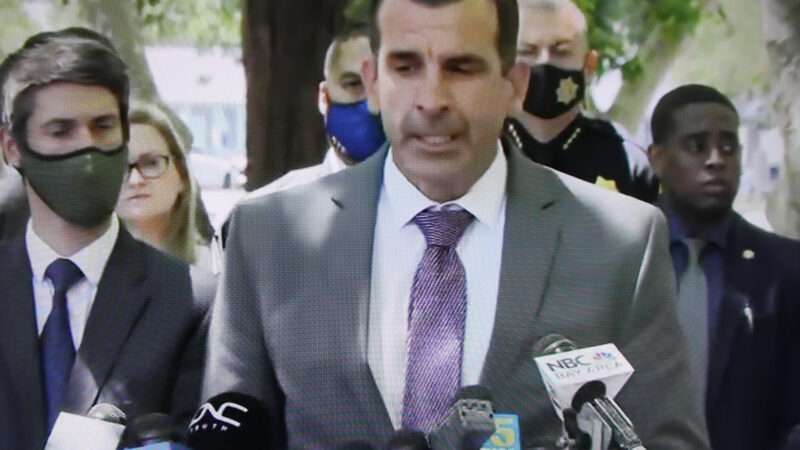
On Tuesday, the San Jose City Council unanimously advanced a number of novel gun control proposals, including requirements that gun owners carry liability insurance and that they pay a fee to cover the public costs of gun violence.
“While the Second Amendment protects the right to bear arms, it does not require taxpayers to subsidize gun ownership,” said San Jose Mayor Sam Liccardo in a Tuesday press release. “We won’t magically end gun violence, but we will stop paying for it.”
These proposals come a month after a workplace shooting at a light rail facility in San Jose left 10 people dead, including the shooter.
The mayor describes San Jose’s insurance mandate as a “first-of-its-kind” policy, although the idea has been floating around for a while. Following the 2012 Sandy Hook shooting, a flurry of state lawmakers from Connecticut to California introduced bills mandating gun owners carry insurance. None of those proposals become law.
A House bill introduced this year by Rep. Sheila Jackson Lee (D–Texas) would create a federal insurance mandate in addition to requirements that gun owners get a license, pay an $800 licensing fee, and register their individual firearms.
Most of the details of San Jose’s proposed gun laws have yet to be fleshed out, including the fee structure for gun ownership and how much insurance gun owners might be required to purchase.
The city is asking the Pacific Institute for Research Evaluation (PIRE), a nonprofit research group, to prepare a report on the costs to San Jose taxpayers of gun violence, which will then be used to calculate appropriate fees.
A preliminary report prepared by PIRE ahead of Tuesday’s vote put the annual costs to federal, state, and local governments from gun violence in San Jose at $39.7 million. That figure includes all the costs stemming from murders and assaults as well as suicides and unintentional shootings.
Fee revenue would be split with Santa Clara County, which contains San Jose, to cover things like emergency room treatment, victim assistance, jail, criminal prosecution, and mental health services.
Because the city of San Jose doesn’t have a register of firearm owners, it’d be up to individuals to proactively pay any required fees and get insurance coverage. Those who didn’t would be at risk of fines or having their guns confiscated.
Anthony Mata, chief of the San Jose Police Department, said that officers wouldn’t go door to door to enforce the coverage mandate, but would ask for proof of insurance should they find a gun during the course of other police work.
“Where there’s an interaction, a lawful car stop or consensual search, that’s the opportunity where the officer finds a gun, he can ask the question,” Mata said at Tuesday’s meeting.
San Jose’s proposal is already attracting controversy from gun rights activists. The Sacramento-based Firearms Policy Coalition, a gun rights group, and Gun Owners of California have both said they intend to sue the city. “The mayor will have his rear end handed to him in a basket by the courts,” said Sam Paderes, executive director of the Gun Owners of California, to the Guardian last week.
Liccardo himself was quite cavalier about the possibility that the city would end up in court, saying Tuesday that “when it comes to sensible gun control, no good deed goes unlitigated.” The mayor also said that the city had consulted with a number of outside groups, including the Giffords Law Center, a gun control group, on the legality of its proposals.
George Mocsary, a law professor at the University of Wyoming, says that San Jose’s proposed gun control policies raise a number of constitutional issues.
It’s highly questionable, he says, if insurers will actually write the kinds of policies that San Jose would require gun owners to purchase. If they don’t, then they would be unable to comply with the city’s mandate, and thus effectively would be prohibited from owning firearms.
“You can’t intentionally ban something indirectly if you can’t ban it directly,” he says, adding that if gun owners were required to pay exorbitant fees or to purchase more insurance than what would be considered “actuarially fair,” that would likely also be unconstitutional.
Mocsary also raises some practical concerns with requiring gun owners to carry insurance, arguing that it could increase the potential for more firearm injuries.
“The best way to incentivize more of an activity is to take away the financial consequences of that activity,” he tells Reason. “If you are taking away from individuals the financial consequences of people being hurt by their guns because their insurance will pay for it, the natural behavior will be for people to take less care.”
The memorandum that the San Jose City Council approved yesterday laid out only the broad strokes of its insurance mandate and gun ownership fees. It directs the city attorney to draft more detailed ordinances by September. Once complete, those ordinances will then go before the city council for another vote.
from Latest – Reason.com https://ift.tt/3y8GJAX
via IFTTT